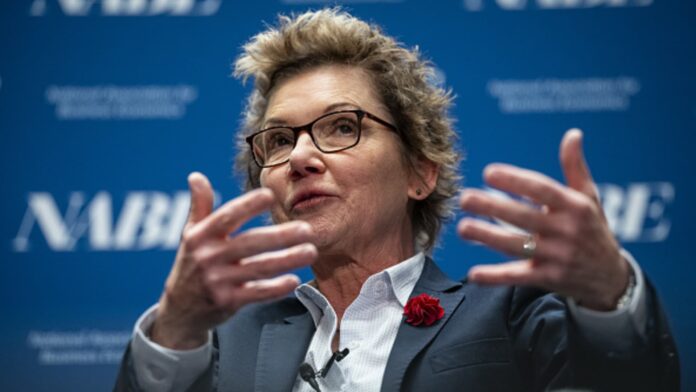Mary Daly, President of the Federal Reserve Bank of San Francisco, during the National Association of Business Economics (NABE) Economic Policy Conference in Washington, DC, USA, on Friday, February 16, 2024.
Graeme Sloan | Bloomberg |
Mary Daly, president of the U.S. Federal Reserve Bank of San Francisco, said on Monday that she expects interest rates to be cut later this year, but declined to give a timetable or the extent of the rate cut.
With markets expecting drastic cuts starting in September, Daly said progress on inflation and a significant decline in hiring would likely prompt the Fed to ease its monetary policy some.
“There will be policy adjustments needed in the coming quarter. How much of that needs to be done and when that needs to happen will, I think, depend a lot on the information that comes in,” she said during a forum in Hawaii. “But I think we have now confirmed that growth in the labor market is slowing and it is extremely important that we do not let it slow to the point where it becomes a downturn.”
The comments come on the same day that Wall Street suffered its worst decline in nearly two years as investors grappled with fears of slowing growth and the Fed's response. At their meeting last week, Fed officials hinted that lower rates were imminent but did not elaborate.
Over the next two days, consecutive weak reports on layoffs, manufacturing trends and job creation sparked fears that the Fed was moving too slowly.
Daly, who took part in the vote this year on the Federal Reserve's interest-rate-setting Open Market Committee, vowed that policymakers would do whatever was necessary to achieve their economic goals.
“We will do whatever is necessary to ensure that we achieve both of our objectives: price stability and full employment,” she said. “We will make policy adjustments when the economy delivers the data and we know what is needed.”
Earlier, Chicago Fed President Austan Goolsbee told CNBC that the central bank's “restrictive” interest rate policy makes no sense unless the economy is overheating, which he believes is not the case. If there are signs of problems in the economy, the Fed will “fix” the problem, Goolsbee said.














